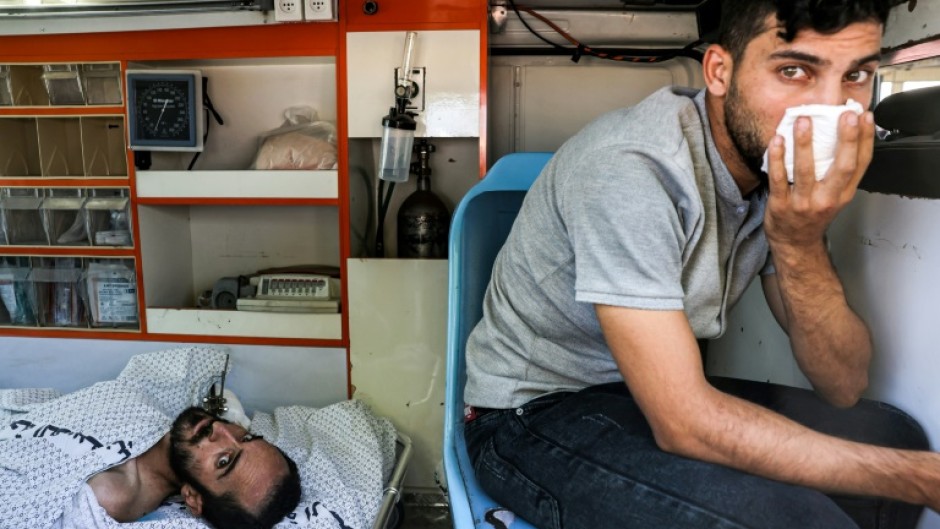GAZA - Ambulances transported wounded residents out of Gaza for urgent medical care in Egypt Wednesday, with hundreds of desperate foreign passport holders also poised to flee the territory wracked by three weeks of bombardment by Israel.
READ: Ground battles rage in Gaza as concern grows for hospitals
The evacuation of the first people to escape war-torn Gaza provided a rare glimmer of hope in an otherwise desolate humanitarian crisis, with 8,796 people killed in Israeli bombing, according to the Hamas-run health ministry.
Prime Minister Benjamin Netanyahu vowed to "continue until victory" over Hamas, whose brutal 7 October attack sparked the latest conflict.
AFP reporters saw a phalanx of 40 white ambulances streaming through the Rafah border crossing, as crowds of foreign and dual national families gathered nearby, hoping to leave the catastrophic conditions of Gaza behind them.
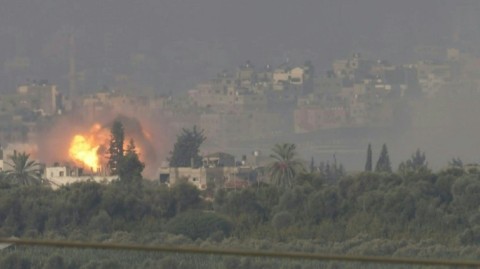
Jordanian citizen Saleh Hussein said she received word in the middle of the night that she was on the list for evacuation.
"We've faced many problems in Gaza, the least of which were the shortage of water and the power outage. There were bigger problems such as the bombardment. We were afraid. Many families were martyred," she told AFP.
AFPTV images showed whole families, struggling to carry their worldly possessions, rushing through the heavily fortified crossing towards Egypt, which was expected to admit at least 400 foreign passport holders and 90 of the most badly wounded and sick.
"It's enough. We've endured enough humiliation," said Gaza resident Rafik al-Hilou, accompanying relatives including children aged one and four.
"We lack the most basic human needs. No internet, no phones, no means of communication, not even water. For the past four days, we haven't been able to feed this child a piece of bread. What are you waiting for?"
Israel has relentlessly pounded Gaza in retribution for the worst attack in the country's history, when Hamas gunmen stormed across the border, killing 1,400 people, mostly civilians, according to Israeli officials.
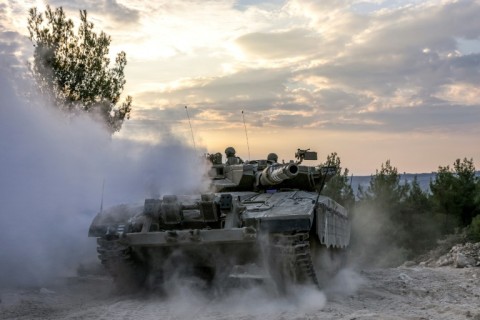
AFP reporters saw more tanks pour over the border into northern Gaza, as Israel stepped up its ground incursion launched late last week.
Images provided by the military showed troops picking through bombed-out houses searching for militants or some of the 240 hostages seized by Hamas.
Israel said 11 soldiers died in ground fighting in Gaza on Tuesday, taking to 326 the number of troops killed since 7 October.
- 'An earthquake' -
The temporary border opening with Egypt provided the first glimmer of hope in the flaring humanitarian crisis in Gaza which the UN and other aid agencies have described as "unprecedented".
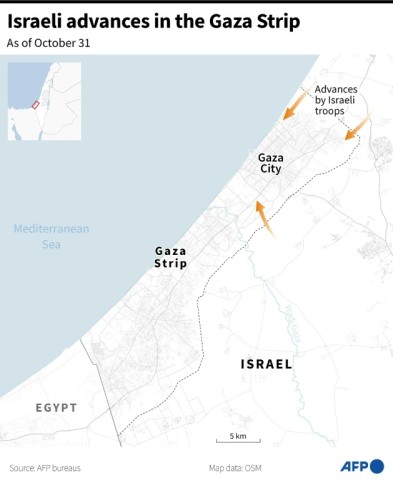
A strike on Gaza's largest refugee camp killed at least 47 people Tuesday -- including a Hamas commander involved in the October 7 attacks, according to Israel.
Horrified resident Ragheb Aqal, 41, likened the blast to "an earthquake" and spoke of seeing "homes buried under the rubble and body parts and martyrs and wounded in huge numbers".
Israel said its warplanes had hit a "vast" tunnel complex at the site, killing "many Hamas terrorists", including local battalion commander Ibrahim Biari.
But the strike sparked a chorus of condemnation from Qatar, Saudi Arabia and also further afield in Bolivia, which cut off diplomatic ties in protest -- a decision Israel labelled "surrender to terrorism".
Hamas said seven hostages, including three foreign passport holders, had died in the bombing, a claim impossible to verify.
- 'No hope in Gaza' -
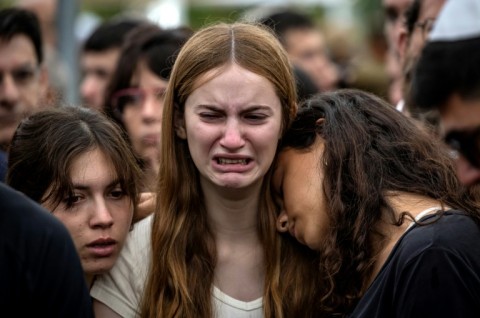
The situation in Gaza remained desperate, with food, fuel, and medicine for the 2.4 million residents all running short, according to aid groups.
Palestinian residents told AFP they had evacuated from northern Gaza, as demanded by Israel, but were still under threat.
"We've been told people are evacuating from Gaza City towards the central area of the Strip beyond the valley, so we headed there. After 20 days, we were bombarded. Three of our kids lost their lives and we all got injured," Amen al-Aqluk told AFP.
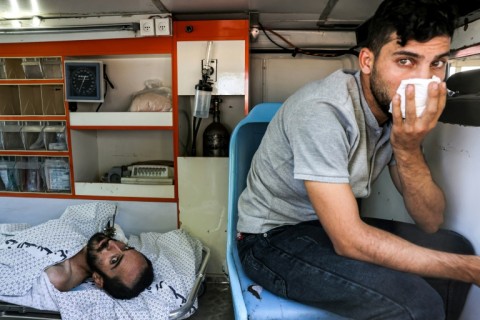
"There is no hope in the Gaza Strip. It is not safe anymore here. When the border opens, everybody will leave and emigrate. We encounter death everyday, 24 hours a day."
Israeli officials said 70 aid trucks entered Gaza from Egypt Tuesday, one of the biggest ever daily flows, but far less than humanitarian groups say is needed.
Fearing supplies entering Gaza could be diverted to Hamas, or that aid shipments could conceal arms, Israeli security personnel carry out stringent inspections that have slowed the flow of aid to a trickle.
- 'We have no more tears' -
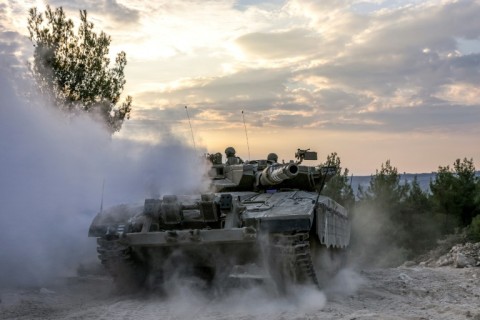
With fears mounting the violence could spiral into a regional war, US President Joe Biden called for "urgent mechanisms" to dial down tensions and said top diplomat Antony Blinken would embark on another Middle East tour from Friday.
Turkey and Iran called for a regional conference to prevent a conflagration, as Israel faces a daily barrage of aerial attacks from Hamas and other Iran-backed groups around the Middle East, including Yemen's Huthi rebels.
In the north, Israel has traded near-daily fire with Lebanon's Iran-backed Hezbollah movement.
And the families of hostages kidnapped by Hamas endure an unbearable wait for news of relatives thought to be held in the labyrinth of tunnels deep below Gaza.
Ayelet Sella, whose seven cousins were kidnapped from one of the kibbutz communities raided by Hamas gunmen, said she could find "no rest" until her loved ones are returned.
"We have no more tears, our eyes are dry, we are empty three weeks on," said Sella, speaking to AFP at the Great Synagogue in Paris. "I only ask for one thing, that they come back."
By Adel Zaanoun With Jonah Mandel In Jerusalem

